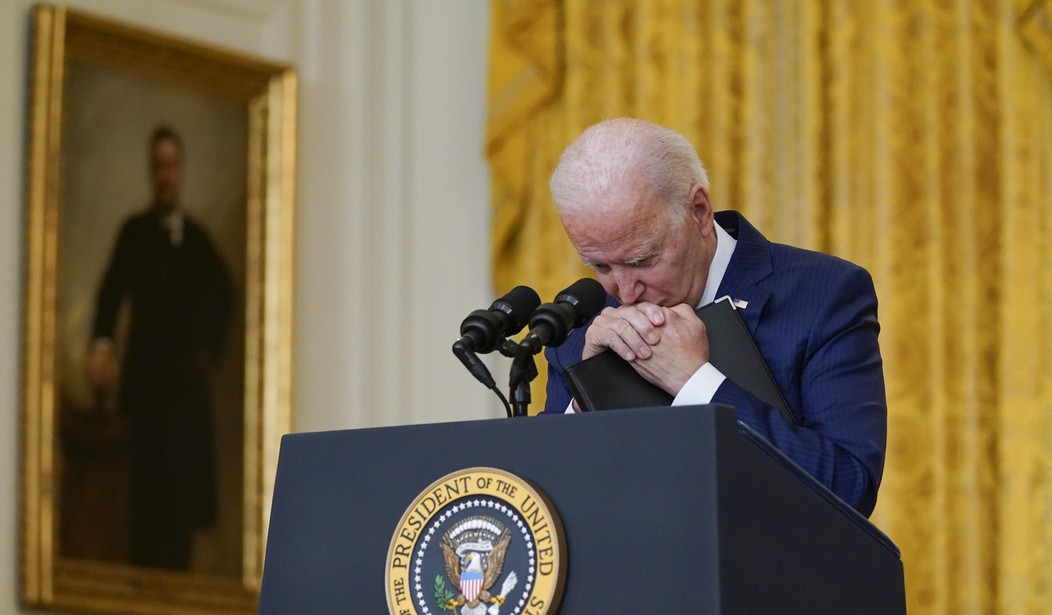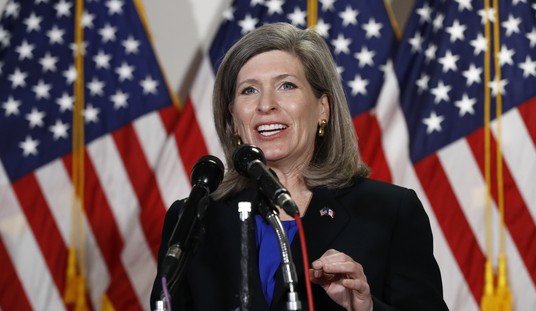Maybe I spoke too soon in calling yesterday’s Quinnipiac poll the “doom” poll for Dems.
This new one from Morning Consult feels even more ominous.
The president always takes the blame for a weak economy but that’s especially perilous during an age of inflation and even more so when a short straight line can be drawn from his policies to a rising cost of living. The “optimistic” case for Democrats next fall is that they may lose the House but it won’t be a bloodbath, mainly because there just aren’t that many true swing districts left on America’s electoral map. But the worse inflation gets and the more the public decides that the White House is responsible, the more vulnerable even bluish districts will be. All bets will be off:

Who are the 38 percent who *don’t* think Biden’s policies are partly to blame for rising prices? After Dems spent nearly $2 trillion on COVID relief this spring, teed up another trillion for roads and bridges (with Republican help), and are moving towards $2 trillion for social programs in the reconciliation mega-bill, what more could they do in the middle of a supply-chain crisis to goose inflation? They’re carpet-bombing an already overheated economy with money. They’d have to send the Navy to sink cargo ships to make the problem any worse.
Per Politico, 85 percent of Republicans, 61 percent of independents, and even 41 percent of Democrats believe Team Joe’s policies are either very or somewhat responsible for inflation. The bulk of those who disagree, I assume, are lefties and left-leaners who’ll reflexively answer any question that begins “Is Biden response for…” with “no” so long as what follows is bad.
But even partisan or ideological sympathy for Biden can’t hold back the shift towards pessimism about the economy:
Voters are 11 points more likely to say the U.S. economy will worsen in the next year compared to what they said in a July survey. https://t.co/TJxYXYRFQ1 pic.twitter.com/EhRCtDalJ1
— Morning Consult (@MorningConsult) October 20, 2021
I’m a pessimist by nature but I lean towards optimism on the economy for the simple reason that COVID has to recede sooner or later. We won’t get rid of it but we’ll reach a level of population immunity that makes seasonal waves much milder than they’ve been since 2020. Once that happens, it should unlock some of the bottled-up supply of labor:
WHERE HAVE ALL THE WORKERS GONE?https://t.co/uzlchcYNK5
JPMorgan guesstimate:
35%: financial cushion with unemployment benefits, stimulus, savings
20%: early retirees
10%: immigration and visa issues
10%: rise in self-employment
25% "other": COVID fears, child care constraints pic.twitter.com/eZuR1mlXgU— Derek Thompson (@DKThomp) October 20, 2021
Having more Americans back on the job will ease supply-chain disruptions and restore a sense of cultural normalcy, at which point maybe we should begin to see sustained growth. COVID won’t disappear but the pandemic as we’ve known it will end. That’s the optimistic scenario.
The pessimistic scenario is that the atomic bomb of fiscal stimulus that Democrats are about to drop on the economy will create durable inflation that lays waste to American wages for the next year. How do you suppose they’ll do at the polls in that scenario?
Kristen Soltis Anderson is a pollster for Echelon Strategies and has a piece today confirming Morning Consult’s findings. Americans have been keenly aware of rising prices for months and they’ve also been clear on whom they blame for that rise. If centrist Dems can read this and follow through with more blockbuster spending via reconciliation, they have a political death wish:
When in March, I first saw the issue pop up in my Echelon Insights monthly survey of registered voters nationwide, I was admittedly a little surprised. When we asked voters whether any of the criticisms of the $1.9 trillion American Rescue Plan worried them, a majority were very or extremely concerned that the plan might lead to inflation. This was higher than concern that the money wouldn’t be spent properly or wasn’t directed to the right places.
In June, the issue hadn’t gone anywhere . Some 71% of voters said “inflation” was a big problem. When asked as “rising prices” instead of “inflation,” concern went up to 78%. And voters were still connecting it to government spending. We presented respondents with six different factors and asked to what degree they thought each had contributed to rising prices. Two-thirds felt “increased government spending” had contributed “a lot,” making it the highest factor on the list, outpacing second-place “corporate profits” (53%) and rising consumer demand (53%).
Biden’s gambling that the goodies in the infrastructure package will please Americans more than the resulting inflation will anger them. He’s kidding himself. Americans won’t feel some of the benefits from the package for months as federal agencies get tangled up in red tape, forming new rules to implement the legislation. Some voters in Group A will come away disgruntled that those in Group B did better under the Biden scheme than they did. And some goodies will have unintended consequences that make recipients’ lives harder. Matt Bruenig argues today that the boost in wages for child-care workers provided for by the reconciliation package will send child-care costs for families soaring before subsidies kick in to defray those costs. How happy do you think the Dems’ new suburban base will feel to suddenly be paying thousands more to have the kids taken care of? How many working parents will have to quit their jobs and become stay-at-home moms or dads because that’s suddenly cheaper than day care is?
The smart move for Democrats at this point would be to abandon reconciliation, pass the bipartisan infrastructure bill, and throw all of their energy into stabilizing supply and demand. But there’s a cold logic to the counterargument to that: Because Americans almost always rally behind the out-party in a midterm no matter what the ruling party does, Dems are probably sunk next November either way. They’re better off getting their agenda through and taking a beating than slamming on the brakes and taking a slightly lesser beating. Whether the public will be better off with respect to its weekly grocery bills is a separate matter.







Join the conversation as a VIP Member